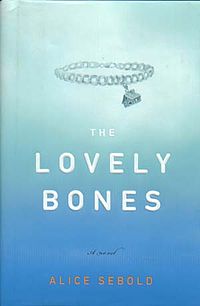The afterlife in Alice Sebold's The Lovely Bones

The Lovely Bones was a mega-hit back when it was released in 2002. I skipped it at the time (I wasn't much interested in contemporary fiction then) so I guess I'm late to the party on this one. The book is billed as a beautiful and tragic meditation on grief and loss. But I have to agree with Roger Ebert's assessment of the movie: it's creepy.
We are introduced to the narrator after her death. She looks down from Heaven and watches all of her friends and family through a gauzy, dreamy light. I think "spies on" would be a more accurate term, although the author never seems to have qualms about the dead Susie Salmon's transgressions against the privacy of the living. And apparently in Heaven you can spy on people all you want, since not only is Susie never reprimanded for her new pastime; it seems to be actively encouraged.
If you have ever worried that your dead grandmother might be watching you take a dump, then this book is there to assure you that you're right. She does. And she's probably watching your more intimate moments as well. Even reveling in them, since there is apparently no sex or touching in the afterlife.
I feel like this novel started off with the common melodramatic teenage fantasy of "They'll miss me if I died." To watch everyone in tears at your funeral, and watch as they try to put the pieces of their shattered lives back together. But it goes off the rails from that starting point, and badly.
Without giving anything away, the dramatic narrative often seems to be building to an inevitable suspenseful climax, but it always fizzles out. Justice comes only at the end, seemingly as an afterthought. It's unsatisfying to say the least. In Ebert's words, this book "fails on its own terms."
Image copyright Alice Sebold/Little, Brown

2 comments